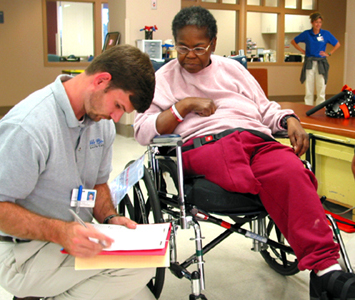JACKSON, Miss.—Most people don’t like going to the hospital, but 79-year-old Mary Rice of Gulfport figures it may have saved her from drowning in Hurricane Katrina.
If she hadn’t been in Gulfport Memorial Hospital, she surely would have been overwhelmed by the rising floodwaters in her youngest daughter’s ground floor apartment in Pass Christian.
“I couldn’t have gotten upstairs,” said Rice, who was in the hospital recovering from extreme weakness when Katrina hit. “I would have gotten killed if I had stayed there. My daughter said the water came up to their knees on the second floor.”
Fortunately, a drain near the apartments gave the water a place to recede and Rice’s daughter, three grandchildren and one great grandchild were able to go for help. “They started walking and they ran into my oldest grandson who took them to Bayou View apartments in Gulfport.”
While her four children figure out the family’s next step, Rice feels grateful to be recouping at Methodist Rehabilitation Center in Jackson. She is among 17 patients who found a safe haven at Methodist after riding out the hurricane at Gulfport Memorial.
Methodist chief executive officer Mark Adams said staff at the 124-bed hospital was glad to be of service in such a time of crisis.
“Rehabilitation patients require special care, so we were eager to come to the aid of people who were in places where rehab facilities were damaged or they needed to free up beds for hurricane victims,’ Adams said. “We also can help with severely disabled patients who have special medical needs through our long-term residential care facility—Methodist Specialty Care Center.”
The first wave of patients arrived at Methodist on Sept. 1 and included three transfers from Forrest General Hospital in Hattiesburg and four from the University of Mississippi Medical Center in Jackson.
Around 11:30 p.m. Sept. 2, a yellow school bus from Gulfport Memorial pulled up at Methodist carrying 13 patients. By midnight, another four transfers arrived in vans.
“They had experienced everything from strokes and fractures to brain injuries and amputations,” said Janice McGee, vice president and program director at Methodist.
About 25 Methodist doctors, nurses, therapists and administrators warmly welcomed the exhausted evacuees and quickly turned their attention to ensuring the group was safe and comfortable.
“We had hot meals prepared for the patients and clean beds and linens,” McGee said. “They were so happy. They said they thought they had died and gone to heaven. They were so glad to see such a bright beautiful building with lights.”
“I was glad when we got close to electricity,” said 67-year-old Nobie Woodson of Picayune, who is Rice’s roommate at Methodist.
Woodson said she was at Gulfport Memorial rehabbing from a diabetes-related amputation of her right leg when the hurricane came calling. “Katrina was no lady,” she said. “I lived through Camille and this was much worse. You could hear windows cracking and the wind howling like never before.”
While Woodson and Rice say they feel fortunate to have been transferred to Methodist, they worry about their loved ones back home. “My sister lost her house and everything she had,” Woodson said.
Rice said her extended family on the Coast was left with “what we have on our backs.” But as she lies in bed resting between therapy sessions, Rice is not feeling sorry for herself. “I’m thanking God for the ones he did spare and praying for the ones who are still here and don’t have homes and food,” she said.

